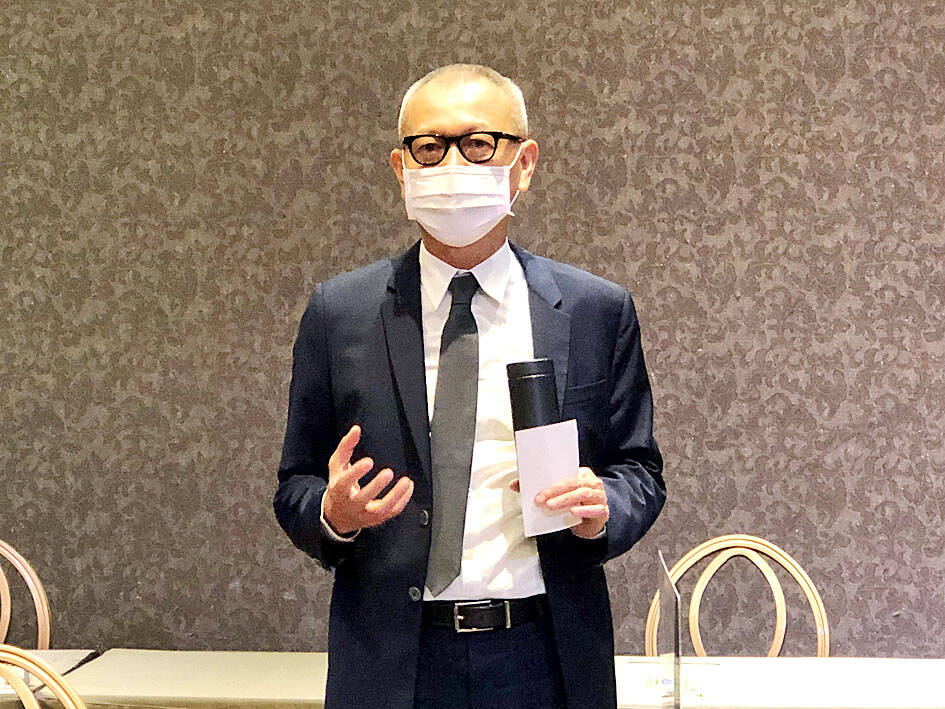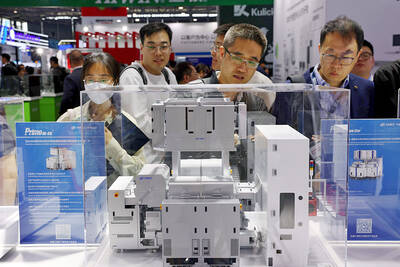Yageo Corp (國巨) yesterday said it has reached an agreement with Heraeus Holding GmbH to fully acquire its subsidiary Heraeus Nexensos GmbH in an all-cash transaction worth NT$2.84 billion (US$89.12 million) in an effort to build a greater presence in the global industrial devices and vehicle electronics markets.
It is to be Yageo’s first acquisition since it acquired Kemet Corp in November 2019 for US$1.64 billion. The company has grown into the world’s No. 3 maker of passive components through 20 mergers and acquisitions over the past two decades.
Heraeus Nexensos, which is headquartered in Hanau, Germany, makes premium platinum thin-film temperature sensors for high-precision measurements, and has more than 100 years of history in the high-end industrial and automotive segments.

Photo: CNA
As of last year, about 60 percent of Heraeus Nexensos’ revenue was from North America and Europe, Yageo said in a statement.
All of its revenue came from industrial and automotive customers, the statement said.
Heraeus Nexensos’ revenue last year was 78.46 million euros (US$76.27 million), it said.
“To us, temperature sensors are a great addition to our existing sensor portfolio from Yageo and Tokin Corp, and the perfect product to propel us further into the sensor market given the similarities in business models and secular trends,” Yageo chairman Pierre Chen (陳泰銘) said in the statement.
Tokin, based in Sendai, Japan, is an arm of Kemet that manufactures passive components, making tantalum capacitors, electric double-layer capacitors and sensors, the company’s Web site says.
“Heraeus Nexensos has a highly complementary set of products and customers, especially in the automotive and industrial segments, which are the key drivers for future growth,” the Yageo statement said.
It operates two manufacturing sites in Germany and Malaysia with a total workforce of about 480, it said.
About 20 percent of Yageo’s revenue in the second quarter came from passive components — multilayer ceramic capacitors and chip resistors used in vehicles, it said.
The company aims to increase the revenue contribution to about 22 percent next year, it said.
The acquisition would give Yageo immediate cross-selling opportunities and boost its market share, the statement said, adding that it would help its customers simplify their supply chain management to create value and convenience.
The goal is to complete the deal in the first half of next year, subject to customary closing conditions and the receipt of required regulatory approvals, it said.

SEMICONDUCTOR SERVICES: A company executive said that Taiwanese firms must think about how to participate in global supply chains and lift their competitiveness Taiwan Semiconductor Manufacturing Co (TSMC, 台積電) yesterday said it expects to launch its first multifunctional service center in Pingtung County in the middle of 2027, in a bid to foster a resilient high-tech facility construction ecosystem. TSMC broached the idea of creating a center two or three years ago when it started building new manufacturing capacity in the US and Japan, the company said. The center, dubbed an “ecosystem park,” would assist local manufacturing facility construction partners to upgrade their capabilities and secure more deals from other global chipmakers such as Intel Corp, Micron Technology Inc and Infineon Technologies AG, TSMC said. It

EXPORT GROWTH: The AI boom has shortened chip cycles to just one year, putting pressure on chipmakers to accelerate development and expand packaging capacity Developing a localized supply chain for advanced packaging equipment is critical for keeping pace with customers’ increasingly shrinking time-to-market cycles for new artificial intelligence (AI) chips, Taiwan Semiconductor Manufacturing Co (TSMC, 台積電) said yesterday. Spurred on by the AI revolution, customers are accelerating product upgrades to nearly every year, compared with the two to three-year development cadence in the past, TSMC vice president of advanced packaging technology and service Jun He (何軍) said at a 3D IC Global Summit organized by SEMI in Taipei. These shortened cycles put heavy pressure on chipmakers, as the entire process — from chip design to mass

Germany is to establish its first-ever national pavilion at Semicon Taiwan, which starts tomorrow in Taipei, as the country looks to raise its profile and deepen semiconductor ties with Taiwan as global chip demand accelerates. Martin Mayer, a semiconductor investment expert at Germany Trade & Invest (GTAI), Germany’s international economic promotion agency, said before leaving for Taiwan that the nation is a crucial partner in developing Germany’s semiconductor ecosystem. Germany’s debut at the international semiconductor exhibition in Taipei aims to “show presence” and signal its commitment to semiconductors, while building trust with Taiwanese companies, government and industry associations, he said. “The best outcome

Semiconductor equipment billings in Taiwan are expected to double this year, as manufacturers in the industry are keen to expand production to meet strong global demand for artificial intelligence applications, according to SEMI, which represents companies in the electronics manufacturing and design supply chain. Speaking at a news conference before the opening of Semicon Taiwan trade show tomorrow, SEMI director of industry research and statistics Clark Tseng (曾瑞榆) said semiconductor equipment billings in Taiwan are expected to grow by an annual 100 percent this year, beating an earlier estimate of 70 percent growth. He said that Taiwan received a boost from a